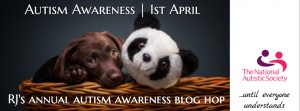
When I saw RJ had picked the theme of animals for this year’s Autism blog hop, my first thought was actually feeling a little sorry for you guys. Coz I when I hear animals, I think dogs. Because dogs are one of my special interests* Which means I figured I would end up blathering on about dogs to you for ages…and ages and ages and ages.
So in an effort not to bore y’all to death and for this blog post to not go on forever I was trying to think about how I could narrow it down. Which isn’t easy. But then I was thinking about when I went for a diagnostic meeting with a specialist about my ASD and I mentioned I had a dog and the doctor seemed almost relieved and very enthusiastic about it. I was telling her how I found it much easier to relate to dogs than people and she told me that wasn’t uncommon amongst people on the spectrum.

Which is how I started to think that actually, people on the autism spectrum are like dogs. Okay, maybe we’re not like dogs but we have a lot in common with them. Or maybe they have a lot in common with us.
No, really. Hear me out.
It’s tenuous I know but I was thinking about was…
Eye contact
Probably the first thing people think of when they think of someone with ASD is that they don’t like eye contact. I can only speak from personal experience but yes, it can be hard. A lot of the time I don’t know where to look when I’m talking to someone so I force myself to look at their face. Occasionally, I’ll have no difficulty at all and I feel surprising comfortable doing it, and other times with other people, not only do I not want to look at them but I don’t want them to look at me. At all. The dog version of this is that eye contact, especially with a stranger, can be an act of violence as far as a dog is concerned. They can tell the difference between a glare from a stranger and a loving look from their owner but, generally on meeting, eye contact is not necessary, often discouraged, although acceptable once a relationship is established. If a dog is barking at you, nine times out of ten, all you need to do is look away and it’ll calm down.

No such thing as an awkward silence
It seems like the usual neurotypical thing is to be social via lots of touching and enthusiastic conversation. This can be overwhelming and exhausting for someone with ASD. Similarly, many people try to engage dogs this way and wonder why it doesn’t work out. I know that my dog is really comfortable with another dog when they bumble around the park in close proximity but basically ignoring each other. Also, in working with nervous rescues, I’ve had much better and quicker success in sitting quietly with them, than by trying to baby talk or reaching to pet them. For me, spending time with someone who sits close and silently works on their laptop while I write or read is heavenly. And social. I feel much more relaxed and engaged than sitting in a pub. Not that I dislike that activity, it’s just that it wears me out and I feel anxious so it’s not so much fun.

Miscommunication
A dog with a wagging tail is not happy. It’s excited. A dog that chews up the carpet when you go out is not naughty, it’s extremely anxious. A guilty-looking dog is in fact terrified of you. Dogs don’t feel guilt. Why should they? Their behaviour is all geared towards communicating with their owner except the owners just get angry for reasons the dogs don’t understand. One of the things people say about people with ASD is that they lack empathy or emotion. I don’t know about others but I can tell you for me that’s not true. At least on the inside. Sometimes we might not have the right response because it’s so hard to tell what particular facial expressions means, or it might take a while to see why someone might be so upset. Sometimes it’s simply because really hard to find the words to express ourselves. Other times we might be called anti-social because we wear headphones all the time or get called strange because we have tics or hand gestures that people take the wrong way. Either way, it’s not a case of “we’re right, you’re wrong”, it’s just that our way of communication with people is different.

So when I say I feel more comfortable and connected to dogs than people, I think it’s because I get them, and I feel like they get me. They like routine and so do I. They like cuddles sometimes and don’t expect me to talk about…well, anything. They’re less complicated than people and, although she doesn’t smell quite as good and takes up all the damn bed with her pointy toes, I can be certain that Lily will never wake up in the morning and tell me out of the blue that she doesn’t love me anymore. She’s predictable that way.
Anyway, thanks for reading this. Don’t forget to check out all the other stops on the blog hop. I think I’m supposed to be giving away something so FREE PUPPIES FOR EVERYONE!!! Just kidding. How about this…in the next Alphas’ Homestead book—Longing for Shelter coming out sometime next month (Chuck willing)—, there is a new canine addition to the pack, so if you leave a comment, I will get the random number generator to pick someone to receive a paperback copy of the book when they’re ready. So virtual puppies…for one person.


*As I understand it, having special interests is part and parcel of ASD. The interests can change over time and can vary in intensity depending on the individual. My main interest is dogs—dog behaviour, dog training, the rehabilitation of rescue dogs, how dogs function in relation to their human pack. This extends to the natural behaviours of wild dogs, particularly (you guessed it) wolves. My other interests include TV shows, particularly crime drama, and logic puzzles. Also a caveat to say ASD is a broad and varied spectrum and my experiences aren’t necessarily going to be like anyone else’s.
Information on Autism
http://www.autism.org.uk/about/what-is/myths-facts-stats.aspx
http://kerrymagro.com/68-things-to-know-about-autism-for-autism-awareness-month/
https://www.cdc.gov/ncbddd/autism/facts.html


So true for all, AJ. I think that understanding my dog is a lot like trying to understand my son. They can’t necessarily tell me how they’re thinking or feeling, but if I’m in tune with their body language, their energy level, it can help me figure it out. All the love you your Lily!
XOXOXO
🙂
Thank you for the interesting post. I have young nieces and nephews and sometimes the stray thoughts they act like puppies enter my mind. I can certainly understand the point you were trying to make and it think it’s a great example.
Thank you for your interesting post. I recognize so many of that by my son. We had to teach him to make eye contact when greeting a person. It is still hard for him to do. It doesn’t come naturally for him.
Also the part of not having emotions and saying the wrong things. He could laugh at me when I was falling down and got hurt. He didn’t mean that, because he was always very attentive of me. But at the moment itself, he didn’t know how to act.
This is s good! It also explains why all my kids (all three with different ASD) like dogs! 🙂 They are also fond of our cat, but cats are so different from dogs! And like with dogs, you have to be loving but firm and consequent to your kids with ASD. I love them dearly!
Love to you and your Lily!
Thank you for the interesting post. I see the similarities you point out, although I’d never thought about it before!
Thank you for such an interesting post Alex I thought this sentence was so true.
“Either way, it’s not a case of “we’re right, you’re wrong”, it’s just that our way of communication with people is different.
Thank you, Alex, for sharing your experiences and thoughts. I really enjoyed your post. I especially loved this quote: “I can be certain that Lily will never wake up in the morning and tell me out of the blue that she doesn’t love me anymore.”
I love your post, very interesting! I have a 21 year old non-verbal, low-functioning autistic son, one of my five kids. I so appreciate your post and for raising awareness of autism this month!